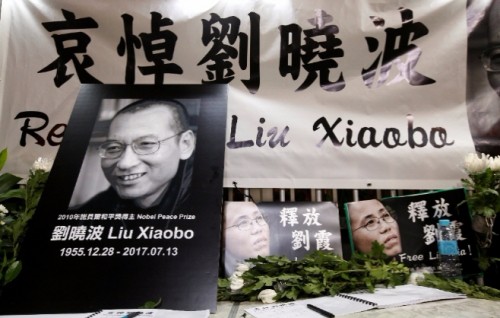By Hong Soon-do, Beijing correspondent, AsiaToday
Liu Xiaobo, who was China's most prominent human rights activist and the 2010 Nobel Peace Prize winner, passed away on July 13 at the age of 61 but he is unlikely to rest in peace for a long time. It's because the authorities in China are treating the deceased so harshly despite the U.S. and the western world's request for favorable arrangements. Besides, Chinese authorities are not expected to allow Liu Xia, the widow of Liu Xiaobo, to travel abroad.
 |
| A shrine set up by Hong Kong residents to mourn the death of Liu Xiaobo, who died on Thursday of liver cancer at the First Hospital of China Medical University in the northeastern city of Shenyang./ Source: Anonymous Twitterian in China. |
According to a diplomatic source in Beijing on Sunday, the Chinese government has buried the ashes of the late Nobel laureate at sea in the previous day despite strong opposition from his family. Besides, China reportedly cremated his body even though Ms. Liu asked them to keep her husband's body frozen. The motivation behind the sea burial was so that supporters could not create a shrine to pay tribute to him and to prevent group resistance of supporters.
Media censorship, which is not respectful toward the deceased, is being actively implemented. In any media, articles related to him are not covered more than once. This is why most Chinese are unaware of him and his death. The aggressive attitude of Chinese authorities is not so different in the cyber world. The sad truth is that text messages that included his or his wife's name went unreceived on WeChat, the country's biggest messaging app.
Liu Xia, who is said to be suffering from depression, is getting worsening symptoms perhaps due to the bad treatment of the authorities, the source says. Moreover, she has reportedly lost touch with her family and friends. There is growing concern that she could be placed under house arrest by the authorities. Mr. Zou, a Beijing resident who asked for anonymity, said, "The government's response is unreasonable. He is a Nobel Peace Prize winner. It's so rude to do such thing to the family of the deceased." This means that there are some Chinese people who share the same perceptions with Western governments and citizens.
However, Chinese authorities are determined on such response. This is why Liu's close associates, including the famous human rights activist Hu Jia, were not able to carry out his memorial ceremony. In the same context, China's foreign ministry rejected foreign criticism over the dissident's death, saying, "The handling of Liu Xiaobo's case belongs to China's internal affairs, and foreign countries are in no position to make improper remarks." It seems that Liu Xiaobo will remain as the forgotten name in China for a while.
#China #Liu Xiaobo #Liu Xia #death #authorities
Copyright by Asiatoday
Most Read
-
1
-
2
-
3
-
4
-
5
-
6
-
7





















